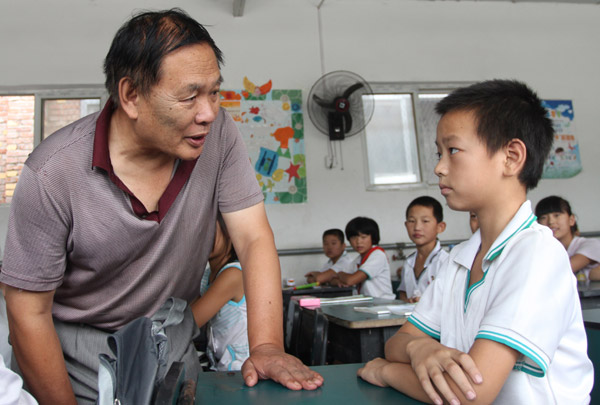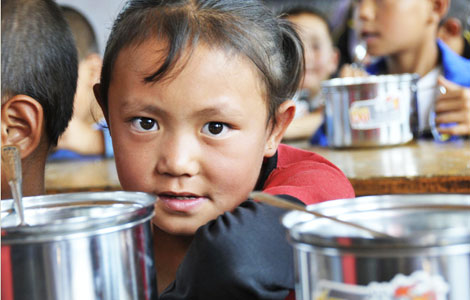Lessons in hope and frustration
Updated: 2011-08-31 07:36
By Cheng Yingqi (China Daily)
|
|||||||||||
Founder of migrant children's school may be facing last semester
BEIJING - The new school term might be the last one Tang Siping will spend with his 1,500 students - all children of migrant workers.
 |
|
Tang Siping talks with a student in Zhenxing School, Beijing, on Monday.[Photo/China Daily] |
Since June, at least 24 schools for the children of migrant workers have been closed in Beijing's Daxing, Haidian and Chaoyang districts, forcing 14,000 students to transfer to other schools.
"I'm prepared for the worst, that I will have to close the school, but I still hope that the education authority won't turn a deaf ear to us," Tang said.
Having poured his life savings into building Zhenxing School, and relocating it five times, the 63-year-old simply can't afford to move again.
Land acquisition and demolitions have already started in neighboring areas.
"I just hope the school will be merged into public schools so the government will ensure its operation," Tang said.
Tang, who used to work as a teacher in the private Xinghua College in Beijing, retired in 1999.
Not long after, Tang saw two children of migrant workers fighting on the street for rubbish in the same waste bin.
"One was from Sichuan province, the other from Anhui province, both 11, they said they didn't have money to go to school," he said.
At that time, access to public schools was mostly restricted to Beijing natives. Although the Beijing Municipal Commission of Education issued a regulation to open public schools to migrant workers' children, they had to pay extra money.
Moreover, their parents could not afford tuition for private schools.
Tang heard that more and more young people from migrant families committed crimes after dropping out of school.
So in 2000, Tang took 100,000 yuan ($15,700), one-third of his life savings, rented a piece of land, built 30 single-story houses in Shucun village in Haidian, and had 10 of his friends volunteer to teach in his school.
That year the school had 70 students aged from 6 to 12, studying various lessons including math, Chinese language, English, music, art and sports. Each student paid 700 yuan a year to the school - a price that remained unchanged until 2009.
In the second semester, another 200 students came to the school.
"I never advertised the school. All the parents came to me because I was charging little," Tang said.
Now the school has more than 1,500 students aged from 6 to 15, paying 840 yuan each per year, which barely covers school expenditures.
To make ends meet, Tang poured in his own money. In 2007, Tang got 1 million yuan in relocation compensation because the government acquired his land in Malianwa, Haidian district.
With the money, Tang immediately paid back the 300,000 yuan he borrowed between 2000 and 2005 to construct the school.
However, the school has been relocated five times in five years because of land requisition, and Tang's money to build classrooms was wasted.
Yang Yanfen, a 40-year-old migrant worker whose two children attend Tang's school, told China Daily that she trusts the teachers there.
"The school is closer to my home, so my children can ask questions to the teachers whenever they have problems with their studies, so I insist sending them here despite the fact that I could save the tuition fee at public schools," Yang said.
In 2010, some big cities lifted public school restriction to migrant workers' children, including Beijing, Shanghai and Hangzhou, Zhejiang province. But media reports reflected that the educational resources could not meet the growing enrollment in some places.
"The existence of schools for migrant workers' children reflects that public schools cannot provide enough educational resources for the children, and that the government did not actually shoulder its responsibility to provide equal access to education for everybody," said Sun Heng, founder of a Beijing-based NGO named Migrant Workers Home Cultural and Development Center.
"Compared to public schools, the private schools for migrant workers' children have various problems. But what the government should do is to help the schools solve the problem, instead of removing them," Sun said.
"Since migrant workers live in suburban areas where there are few public schools, the government should support the private schools. If it fails to let the migrant workers' children feel that they are treated equally, I'm afraid it will have to spend more money building prisons for rebellious young people in the future," Sun said.
Hot Topics
Li Na FIFA Novak Djokovic Liu Xiang Tiger Woods Yao Ming Rafa Nadal Ding Junhui Dirk Nowitzki Lin Dan Lionel Messi Sang Lan Maria Sharapova Wimbledon Barcelona
Editor's Picks

|

|

|

|

|

|





